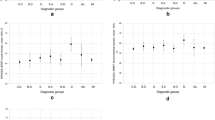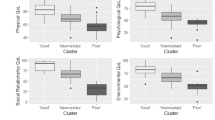Abstract
Objective
To evaluate the impact of demographic and psychosocial background factors and psychiatric and functional status before and at admission on the patients' satisfaction with care (PSC) among first-episode psychosis (FEP) patients.
Method
One year after entering the Parachute Project, 134 FEP patients completed a patient satisfaction questionnaire. The association with demographic and psychosocial background factors, together with psychiatric and functional status before and after admission, was analysed.
Results
Twenty-nine per cent of the variance of PSC was explained by factors such as educational level, social network, duration of untreated psychosis (DUP) and Global Assessment of Functioning (GAF) the year prior to onset. Negative symptoms and lack of hope at admission were also predictors of PSC. The strongest predictor was DUP.
Conclusion
Affecting the public knowledge in psychiatric problems and psychiatric treatment, together with early intervention strategies aiming to decrease the prodromal and DUP period among FEP patients, can positively influence the patients' experience of given care. By increasing the knowledge of available psychiatric treatment, the sense of powerlessness might decrease among the affected persons, and the possibility of early help seeking might increase.
Similar content being viewed by others
References
Alanen Y (1997) Schizophrenia—its origins and need-adapted approach. Karnac, London
APA (1994) Diagnostic and statistical manual of mental disorders, DSM-IV, 4th edn. American Psychiatric Association, Washington, DC
Broker M, Rohricht F, Priebe S (1995) Initial assessment of hospital treatment by patients with paranoid schizophrenia: a predictor of outcome. Psychiatry Res 58(1):77–81
Ciarlo J, Reihman J (1977) The Denver community mental health questionnaire: development of a multidimensional program evaluation instrument. In: Coursey R, Spector G, Murrell S, Hunt B (eds) Program evaluation for mental health: methods, strategies and participants. Grune & Stratton, NY, pp 131–167
Cohen G (1996) Age and health status in a patient satisfaction survey. Soc Sci Med 42(7):1085–1093
Cullberg J, Holmqvist R, Levander S, Mattsson M, Wieselgren I-M (2002) One-year outcome in first-episode psychosis patients in the Swedish Parachute Project. Acta Psychiatr Scand. 106(4):276–285
Eaton WW, Anthony JC, Tepper S, Dryman A (1992) Psychopathology and attrition in the epidemiologic catchment area surveys. Am J Epidemiol 135(9):1051–1059
Eisen SV, Grob MC (1979) Assessing consumer satisfaction from letters to the hospital. Hosp Community Psychiatry 30(5):344–347
Eklund M, Hansson L (2001) Determinants of satisfaction with community-based psychiatric services: a cross-sectional study among schizophrenia outpatients. Nord J Psychiatry 55(6):413–418
Endicott J, Spitzer RL, Fleiss JL, Cohen J (1976) The global assessment scale. A procedure for measuring overall severity of psychiatric disturbance. Arch Gen Psychiatry 33(6):766–771
Fox JG, Storms DM (1981) A different approach to sociodemographic predictors of satisfaction with health care. Soc Sci Med 15(5):557–564
Getz WL, Fujita BN, Allen D (1975) The use of paraprofessionals in crisis intervention. Evaluation of an innovative program. Am J Community Psychol 3(2):135–144
Haley CJ, Drake RJ, Bentall RP, Lewis SW (2003) Health beliefs link to duration of untreated psychosis and attitudes to later treatment in early psychosis. Soc Psychiatry Psychiatr Epidemiol 38(6):311–316
Hall JA, Dornan MC (1990) Patient sociodemographic characteristics as predictors of satisfaction with medical care: a meta-analysis. Soc Sci Med 30(7):811–818
Hansson L, Berglund M, Liljencrantz C, Andersson G, Ohman R (1985) Patient attitudes in short-term psychiatric care. Relations to social and psychiatric background, clinical symptoms, and treatment model. Acta Psychiatr Scand 72(2):193–201
Hasson F, Keeney S, McKenna H (2000) Research guidelines for the Delphi survey technique. J Adv Nurs 32(4):1008–1015
Jorm AF (2000) Mental health literacy. Public knowledge and beliefs about mental disorders. Br J Psychiatry 177:396–401
Jorm AF, Korten AE, Jacomb PA, Christensen H, Rodgers B, Pollitt P (1997) “Mental health literacy”: a survey of the public's ability to recognise mental disorders and their beliefs about the effectiveness of treatment. Med J Aust 166(4):182–186
Larsen DL, Attkisson CC, Hargreaves WA, Nguyen TD (1979) Assessment of client/patient satisfaction: development of a general scale. Eval Program Plann 2(3):197–207
Leavey G, King M, Cole E, Hoar A, Johnson-Sabine E (1997) First-onset psychotic illness: patients' and relatives' satisfaction with services. Br J Psychiatry 170:53–57
Mattsson M (2001) Vad tycker patienten om sin vård? Intervjuer om patienters erfarenheter av den psykiatriska vården i Fallskärmsprojektet [Magisterexamensuppsats]. Lärarhögskolan, Stockholm
McIntyre K, Farrell M, David A (1989) In-patient psychiatric care: the patient's view. Br J Med Psychol 62(Pt 3):249–255
Milner EC, Rowlands P, Gardner B, Ashby F (2001) First episode of psychosis—an audit of service engagement and management at 1–2 year follow-up. Med Sci Monit 7(6):1299–1302
Pascoe GC (1983) Patient satisfaction in primary health care: a literature review and analysis. Eval Program Plann 6(3–4):185–210
Priebe S, Gruyters T (1995) Patients' assessment of treatment predicting outcome. Schizophr Bull 21(1):87–94
Ruggeri M (1994) Patients' and relatives' satisfaction with psychiatric services: the state of the art of its measurement. Soc Psychiatry Psychiatr Epidemiol 29(5):212–227
Shipley K, Hilborn B, Hansell A, Tyrer J, Tyrer P (2000) Patient satisfaction: a valid index of quality of care in a psychiatric service. Acta Psychiatr Scand 101(4):330–333
SPSS (2002) SPSS for Windows, 11th edn. SPSS, Chicago, Illinois, USA
Strauss JS, Carpenter WT Jr (1972) The prediction of outcome in schizophrenia. I. Characteristics of outcome. Arch Gen Psychiatry 27(6):739–746
Ventura J, Green MF, Shaner A, Liberman RP (1993) Training and quality assurance with the Brief Psychiatric Rating Scale: “The Drift Busters”. Int J Methods Psychiatr Res 3:221–244
Ware JE Jr, Davies-Avery A, Stewart AL (1978) The measurement and m0eaning of patient satisfaction. Health Med Care Serv Rev 1(1):1, 3–15
Willer B, Miller GH (1978) On the relationship of client satisfaction to client characteristics and outcome of treatment. J Clin Psychol 34(1):157–160
Williams B, Wilkinson G (1995) Patient satisfaction in mental health care. Evaluating an evaluative method. Br J Psychiatry 166(5):559–562
Author information
Authors and Affiliations
Corresponding author
Rights and permissions
About this article
Cite this article
Mattsson, M., Lawoko, S., Cullberg, J. et al. Background factors as determinants of satisfaction with care among first-episode psychosis patients. Soc Psychiat Epidemiol 40, 749–754 (2005). https://doi.org/10.1007/s00127-005-0945-7
Accepted:
Published:
Issue Date:
DOI: https://doi.org/10.1007/s00127-005-0945-7




